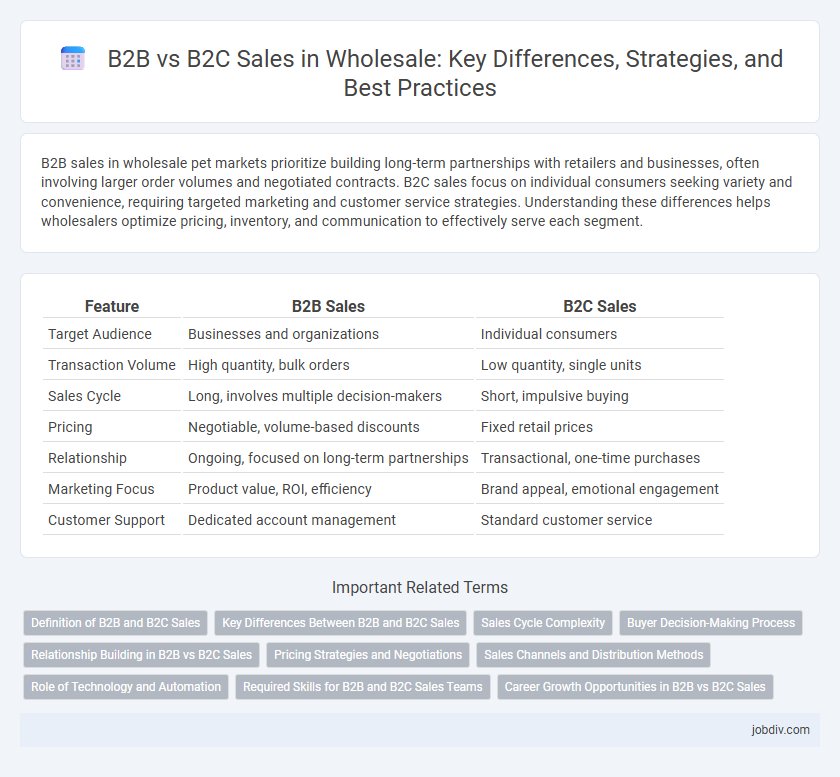B2B sales in wholesale pet markets prioritize building long-term partnerships with retailers and businesses, often involving larger order volumes and negotiated contracts. B2C sales focus on individual consumers seeking variety and convenience, requiring targeted marketing and customer service strategies. Understanding these differences helps wholesalers optimize pricing, inventory, and communication to effectively serve each segment.
Table of Comparison
| Feature | B2B Sales | B2C Sales |
|---|---|---|
| Target Audience | Businesses and organizations | Individual consumers |
| Transaction Volume | High quantity, bulk orders | Low quantity, single units |
| Sales Cycle | Long, involves multiple decision-makers | Short, impulsive buying |
| Pricing | Negotiable, volume-based discounts | Fixed retail prices |
| Relationship | Ongoing, focused on long-term partnerships | Transactional, one-time purchases |
| Marketing Focus | Product value, ROI, efficiency | Brand appeal, emotional engagement |
| Customer Support | Dedicated account management | Standard customer service |
Definition of B2B and B2C Sales
B2B sales involve transactions between businesses, focusing on products or services that meet organizational needs, often characterized by larger order volumes and longer sales cycles. B2C sales target individual consumers, emphasizing quick purchases and emotional appeal to fulfill personal wants or needs. Understanding these definitions helps businesses tailor marketing strategies, sales processes, and customer interactions effectively.
Key Differences Between B2B and B2C Sales
B2B sales typically involve longer sales cycles, higher transaction values, and complex decision-making processes compared to B2C sales, which focus on individual consumers and prioritize quick purchasing decisions. B2B transactions often require tailored solutions, detailed product specifications, and multiple stakeholder approvals, whereas B2C sales emphasize emotional appeal, brand loyalty, and simplified buying experiences. Understanding these differences is crucial for designing effective marketing strategies and optimizing sales funnels in wholesale industries.
Sales Cycle Complexity
B2B sales cycles are typically longer and more complex due to higher transaction values, multiple decision-makers, and detailed negotiation processes, often stretching from weeks to several months. In contrast, B2C sales cycles are usually shorter and more straightforward, driven by individual purchasing decisions and less need for extensive consultation. Understanding these differences is crucial for wholesalers aiming to optimize their sales strategies and tailor communication for each market segment.
Buyer Decision-Making Process
B2B sales involve complex buyer decision-making processes driven by multiple stakeholders, longer sales cycles, and extensive research to assess product ROI and compatibility with business needs. In contrast, B2C sales typically feature quicker decision-making influenced by individual preferences, emotional triggers, and immediate benefits. Understanding these differences is crucial for tailoring sales strategies in wholesale environments to effectively address the specific needs of businesses versus consumers.
Relationship Building in B2B vs B2C Sales
B2B sales emphasize long-term relationship building with clients, relying on trust, personalized communication, and ongoing support to secure repeat business and larger orders. In contrast, B2C sales typically focus on transactional interactions with a broader audience, prioritizing quick decision-making and emotional appeal. Effective relationship management in B2B sales increases customer loyalty and drives revenue growth in wholesale markets.
Pricing Strategies and Negotiations
B2B sales pricing strategies often involve tiered pricing, volume discounts, and customized quotes based on client needs, reflecting longer sales cycles and higher transaction values. B2C sales typically use fixed pricing, promotional discounts, and dynamic pricing models to quickly attract individual consumers and drive impulse purchases. Negotiations in B2B sales focus on contract terms, bulk order incentives, and long-term partnerships, whereas B2C interactions prioritize straightforward pricing and limited negotiation flexibility.
Sales Channels and Distribution Methods
B2B sales leverage direct sales channels and specialized distributors to facilitate bulk purchasing and long-term contracts, prioritizing relationship-building and customized solutions. B2C sales rely heavily on retail outlets, e-commerce platforms, and third-party marketplaces to reach individual consumers quickly and efficiently. Distribution in B2B often involves dedicated logistics services and warehouses, whereas B2C emphasizes rapid delivery systems and widespread inventory availability.
Role of Technology and Automation
Technology and automation play a pivotal role in streamlining B2B sales by enabling efficient inventory management, personalized client interactions, and integrated supply chain solutions that cater to bulk orders. In contrast, B2C sales leverage automation mainly for enhancing customer experience through targeted marketing, seamless e-commerce platforms, and real-time analytics. Advanced CRM systems and AI-driven tools significantly boost operational efficiency and decision-making in wholesale environments, differentiating B2B's complex transactional nature from the high-volume, consumer-focused B2C sales.
Required Skills for B2B and B2C Sales Teams
B2B sales teams require strong relationship-building capabilities, in-depth industry knowledge, and expertise in handling complex negotiations with longer sales cycles. B2C sales teams focus on excellent communication skills, quick decision-making, and the ability to connect with a broad audience to drive high-volume, fast-paced transactions. Both require proficiency in customer insights but prioritize different strategic approaches to meet their target market demands.
Career Growth Opportunities in B2B vs B2C Sales
B2B sales careers typically offer faster growth opportunities due to higher deal values, longer sales cycles, and greater complexity, which develop advanced negotiation and strategic skills. Professionals in B2B sales often ascend to roles such as sales directors or account managers, benefiting from industry-specific expertise and relationship management. In contrast, B2C sales roles may provide quicker entry-level advancement but often involve lower-value transactions and less strategic career progression.
B2B Sales vs B2C Sales Infographic

 jobdiv.com
jobdiv.com